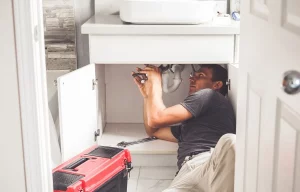
June 28, 2024
The winter season often brings with it frigid temperatures and inclement weather. If the temperatures drop below freezing, you might experience problems with your drains and pipes. Frozen pipes, leaks, and cracks are common during the winter. If you’d like to avoid time-consuming repairs, it’s highly recommended that you have your home’s pipes and drains regularly maintained.
Prepare the Plumbing System
While the best time to prepare your plumbing system for the winter season is before it arrives, the harshest temperatures tend to occur in the latter days of January and into February, which gives you time to make preparations. Pipes can freeze quickly. If the temperatures drop below 32 degrees Fahrenheit, there’s a chance that you’ll encounter this problem.
If there are any existing leaks in your plumbing system, they should be fixed as quickly as possible. You should also ask a plumber to look for any signs of corroded valves or pipes. If corrosion issues are detected, they need to be repaired immediately. Your home might also contain exposed plumbing. If it does, insulate the pipes. Make sure you have your furnace, heat pump, or other heating system inspected as well.
Focus on Preventive Maintenance
If you request services from a plumber, there are several aspects of preventive maintenance they should perform. For example, they should look for drainage issues around your home. You may be able to detect these issues yourself by their smell.
When drainage problems occur, you might notice a strong sewer gas smell. This issue should be fixed immediately. Your plumber should also look for signs of slow drains because of clogs or mineral buildup. If a clog is left untended, it could eventually cause a leak or other serious problem.
Additional Prevention Tips to Consider
There are many things you can do during the winter to keep your home’s drains and pipes in good condition. For example, you should never pour fat down a kitchen drain. Fats invariably solidify over time, which can cause severe clogs in your pipes. All fats should be placed in the trash.
If you have a food disposal system in your home, make sure you run the water for a couple minutes before and after you use it. Showerheads can also contain mineral and sediment buildup. You can remove these substances by soaking the showerhead in vinegar. When the temperatures start to drop, it’s a good idea to avoid placing too much pressure on your plumbing system. To that end, try spreading out showers throughout the day if your home consists of three or more people.
Plumbing pipes end up cracking and bursting because of how water reacts when it freezes. In this scenario, the volume of the water will increase, which causes it to expand and place pressure on the pipes. You can keep your pipes warm and prevent freezing issues by having them insulated with foam.
By performing winter maintenance, you can keep your drains and pipes from freezing and avoid costly repairs. If you believe that there’s a clog in your plumbing system, call Freedom Flow today to schedule our drain cleaning services in Scranton, PA.
Insulate the Water Heater With Foam or an Insulating Blanket
Use slip-on foam or an insulation blanket to cover the pipes and all other exposed parts of the water heater. Before you start:
- Contact the utility company in case they have specific guidelines you should follow.
- Turn off the water heater.
- Look for damage and/or leaks around the water heater – if you notice a problem, contact a plumber.
Be sure to wear gloves, safety glasses, a long-sleeved shirt, and a mask.
Keep Your Water Heater Working for You All Year Long
If you notice a problem with your device, contact one of our licensed plumbers at Freedom Flow in Scranton, PA to determine if it needs water heater repairs. You can rely on us to get your water heater up and running in no time.